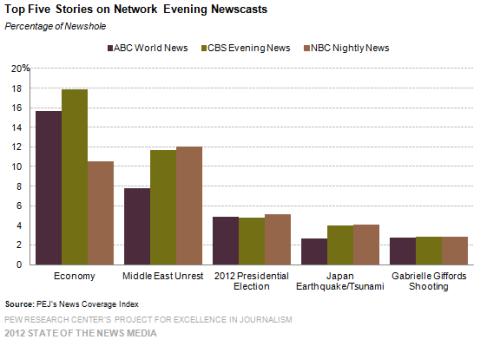Environmental Examiner recently challenged the generally accepted notion that wind turbines are a significant cause of death for birds. The crux of the blogger’s argument is that, yes, some birds do die at the rotor blade of a wind turbine, but in fact not enough to dismiss the great potential of wind power. In Wind Power: Bye Bye Birdie?, the blogger identifies one cause for such a widespread belief:
Media coverage of the few massive bird kill incidents in which astonishing numbers of birds died, spread the notion that all wind turbines in every location are deadly structures.
There is an important underlying message nestled in the above statement: that the media heavily influences not how but what we, the public, think about. Here’s my quick two cents on this “agenda-setting” process: If it is inevitable that the media, particularly the news media, is going to play a significant role in determining what we think about, it should give us something worthwhile—something that encourages us to embrace unconventional thinking that might better the world around us. After all, on an average evening, the three traditional broadcast television networks (ABC, CBS, and NBC) alone receive around 20 million viewers. Clearly network television news, a reliable microcosm of general news media, has an incredibly large audience and thus a lot of people it can influence. But as the saying goes, with great power comes great responsibility.
Last year, the top five stories on the three network evening newscasts were the following:
As a warning, this next question of mine may reveal my maybe too strong sense of idealism. Not that these five stories aren’t important—they are—but what if them was replaced with something like “Ideas that Inspire?” I can admit that topic title might fall on the cheesy side, but I’m sure you get the point. What would it say about our national culture if such a topic was deemed a top priority to share (even more, if we demanded it be a priority)? What kinds of conversations would it spawn? What kinds of ideas might it generate?
In sticking with the realm of alternative energy sources, for example, let’s hear more about companies like Carbon Engineering and its attempt to build the “world’s first air capture plant” that will remove carbon emissions directly from the sky.
In For Our Next Trick, We Will Make Carbon Dioxide Disappear, Lawrence Karol asks the perfect question:
“So if we’re having troubling limiting emissions, why not try and capture them?”
This question, as inherently suggested in the very work of Carbon Engineering, epitomizes the kind of critical thinking we should all be practicing. It’s the kind of thinking that may very well combat our globe’s climate change crisis, and it’s the kind of thinking that the news media should highlight to its audiences. After all, we’re all this together, right?
Carbon Engineering became incorporated in 2009. It is a privately held company funded by angel investors such as well-known philanthropist Bill Gates. Its vision is to become a pioneer in what will hopefully become a large-scale air capture industry, reducing the amount of carbon dioxide that so threatens our earth.
I am not blindly accepting that this is the way to solve our climate change crisis, but I think at the very least it is admirable to take such a novel (and complex!) approach to solving such a longstanding problem. If we want to fix the world’s pressing problems that lie before us, we need to hear stories about the projects, organizations, businesses, etc. that are attempting to do so right now. As one of the most popular storytellers among us, the news media should assume some of that responsibility.



I have to confess to having little patience with primary network news sources, because they are so sensationalist and conventional. And, let’s just say it: they’re downright negative. Some time ago I signed up for a daily newsletter in an effort to create some balance and a bit of optimism in the kind of information I was receiving about the state of the world. The tagline for the organization that sends out the emails (DailyGood) is “News that Inspires”… and over the years they have provided it aplenty, including reports on the imaginative, humanitarian ways that people are trying to solve problems. A few examples:
DailyGood shared an article in January about a rehabilitation program at the New York prison “Riker’s Island” in which inmates are taught horticulture and work together to maintain an herb garden and orchard.
Another article featured the Brazilian surfer Jairo Lumertz who decided to merge his water sport passion with his environmental concern by creating “eco surfboards” made from plastic bottles.
One of my favorite posts on “The Power of Whimsy” discussed Volkswagen’s “Fun Theory” initiative and many similar projects cropping up around the globe, which transform public spaces into areas of playful engagement (e.g. metro stairs turned into piano keys; a railway station with slides; a musical swingset at a bus stop). Although this latter news sampling does not seem to propose any kind of practical solution to urban life, it certainly offers an inspired look at unconventional thinking in action.
I second the call to have “…News Media, Inspire Us!”
So What Should We Do About It?
Interestingly enough, news broadcasts have one of the biggest platforms for relying information and thought provoking topics. Yet, with the most modern media channels the news they report on is hardly, if ever useful. At times, I sit down to catch up on the news and I am left with really nothing but someone else’s opinion on an unreliable topic which has their own personal agenda woven throughout. For example, this article mentions how the news decided to report on Wind Power energy. Common sense tells us that this is a great and powerful new avenue our world is choosing to step into, in hopes of creating better energy sources for our community. Yet, of course the news (probably desperate for a juicy story) directed the minds of its viewers towards something which frankly is just silly.
They highlighted the fact that the wind turbines are killing a significant amount of birds. Just as this article pointed out, I strongly believe no one would have ever thought of some minor detail such as this or would really even care. Although, in the world we live in people who are uneducated about news will grasp onto any little thing they can as to have something to say about worldly issues. Meanwhile the news broadcasters scrounge for stories, any stories, that will be interesting enough to put on the air to keep their ratings and viewer status steady.
The news should provide people with information that isn’t random fact, but possibly provide knowledgeable stories that are relevant. In addition, news has the power to produce thought provoking stories with an overall goal to inspire new ideas and creativity! Just as this article makes me think about how the news can improve, the news should report on facts and open up the platform for it’s viewers to make their own ideas and unique responses to our world’s current events. Overall, the lesson here is, say something if it is worth saying, not just fill the air with empty words.
The news has all the power. By choosing stories that are meaningful and educational they can change and better society. It is also important to note that in the rush to get any story out in the media,” important facts” are either left out, misinterpreted, or made up. The news media has a lot of responsibility and they need to be more aware of it in order for them to correctly use it to contribute to the intelligence of the viewers.